I have a project in Asp.Net Core. This project has a ICacheService as below:
public interface ICacheService
{
T Get<T>(string key);
T Get<T>(string key, Func<T> getdata);
Task<T> Get<T>(string key, Func<Task<T>> getdata);
void AddOrUpdate(string key, object value);
}
The implementation is simply based on ConcurrentDictionary<string, object>, so its not that complicated, just storing and retrieving data from this dictionary. At one of my services I have a method as below:
public async Task<List<LanguageInfoModel>> GetLanguagesAsync(string frontendId, string languageId, string accessId)
{
async Task<List<LanguageInfoModel>> GetLanguageInfoModel()
{
var data = await _commonServiceProxy.GetLanguages(frontendId, languageId, accessId);
return data;
}
_scheduler.ScheduleAsync($"{CacheKeys.Jobs.LanguagesJob}_{frontendId}_{languageId}_{accessId}", async () =>
{
_cacheService.AddOrUpdate($"{CacheKeys.Languages}_{frontendId}_{languageId}_{accessId}", await GetLanguageInfoModel());
return JobStatus.Success;
}, TimeSpan.FromMinutes(5.0));
return await _cacheService.Get($"{CacheKeys.Languages}_{frontendId}_{languageId}_{accessId}", async () => await GetLanguageInfoModel());
}
The problem is that I have three params in this method that I use as a cache key. This works fine but the problem is that the combination of three params is pretty high so there will be so many duplication of objects in cache. I was thinking to create a cache without duplication like below:
To have a cache with a list as a key where I can store more than one key for one object. So when I get new elements I will check for each of them if it is in the cache, if it is in the cache I will only add a key in the key list otherwise insert a new element in the cache. The problem here is that testing if an object is in the cache is a big problem. I think it will consume a lot of resources and would need some serialization into a specific form to make the comparison possible which will make again the comparison consuming a lot of resources.
The cache might look something like this CustomDictionary<List<string>, object>
Does anybody know a good approach of solving this issue to not duplicate objects in the cache ?
EDIT 1:
My main concern is when I retrieve List<MyModel> from my webservices because they might have 80% of the objects with the same data which will drastically increase the size in memory. But this would be relevant for simple cases as well.
Lest suppose I have something like this:
MyClass o1 = new MyObject();
_cache.Set("key1", o1);
_cashe.Set("key2", o1);
In this case when trying to add the same object twice I would like to not duplicate it but to have key2 somehow pointing to the same object as key1. If this achieved it will be problem to invalidate them but I expect to have something like this:
_cache.Invalidate("key2");
This will check if there is another key pointing to same object. If so, it will only remove the key otherwise destroy the object itself.
